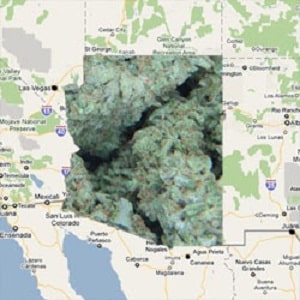 By Paul Armentano, NORML Deputy Director
By Paul Armentano, NORML Deputy Director
The Arizona Supreme Court this week rejected a 1990 state law that classified the presence of inert THC metabolites in blood or urine as a per se traffic safety violation.
Carboxy-THC, the primary metabolite (breakdown product) of THC is not psychoactive. Because it is lipid soluble, the metabolite may remain detectable in blood or urine for periods of time that extend well beyond any suspected period of impairment. As a result, the US National Highway Traffic Safety Administration acknowledges, “It is … currently impossible to predict specific effects based on THC-COOH concentrations.”
Nonetheless, under Arizona law, the mere presence of carboxy THC — absent any evidence of behavioral impairment — was considered to be a criminal violation of the state’s traffic safety laws. (Delaware, Georgia, Illinois, Indiana, Iowa, Nevada, Ohio, Oklahoma, Rhode Island, and Utah impose similar statutes.) On Wednesday, the Court struck down the provision.
Writing for the majority, Justice Robert Brutinel opined: “The State’s interpretation that ‘its metabolite’ includes any byproduct of a drug listed in § 13-3401 found in a driver’s system leads to absurd results. … Most notably, this interpretation would create criminal liability regardless of how long the metabolite remains in the driver’s system or whether it has any impairing effect. For example, at oral argument the State acknowledged that, under its reading of the statute, if a metabolite could be detected five years after ingesting a proscribed drug, a driver who tested positive for trace elements of a non-impairing substance could be prosecuted.”
He added: “Additionally, this interpretation would criminalize otherwise legal conduct. In 2010, Arizona voters passed the Arizona Medical Marijuana Act (“AMMA”), legalizing marijuana for medicinal purposes. Despite the legality of such use, and because § 28-1381(A)(3) does not require the State to prove that the marijuana was illegally ingested, prosecutors can charge legal users under the (A)(3) provision. Because carboxy-THC can remain in the body for as many as twenty-eight to thirty days after ingestion, the State’s position suggests that a medical-marijuana user could face prosecution for driving any time nearly a month after they had legally ingested marijuana.”
The Court concluded: “Because the legislature intended to prevent impaired driving, we hold that the ‘metabolite’ reference in § 28-1381(A)(3) is limited to any of a proscribed substance’s metabolites that are capable of causing impairment. Accordingly, … drivers cannot be convicted of the (A)(3) offense based merely on the presence of a non-impairing metabolite that may reflect the prior usage of marijuana.”
The Court did not address provisions in the state’s per se DUI law outlawing the operation of a motor vehicle with any presence of THC in one’s blood even though, according to NHTSA, “It is difficult to establish a relationship between a person’s THC blood or plasma concentration and performance impairing effects.”
Source: NORML - make a donation


























